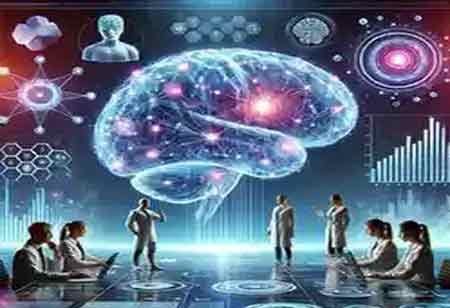Unlocking the Brain: Pioneering Services in Neuropsychology

By
Medical Care Review | Thursday, June 19, 2025
Stay on top of your health and well-being with exclusive feature stories on the top medical clinics and treatment centers, expert insights and the latest news delivered straight to your inbox. Subscribe today.
Neuropsychological centers are at the forefront of providing specialized care for individuals facing cognitive, emotional, and behavioral challenges due to neurological conditions. These centers provide various services to diagnose, treat, and support patients with conditions such as brain injuries, strokes, dementia, and different psychiatric disorders. Technological advancements and evolving treatment methods are reshaping the landscape, opening new opportunities for patients and healthcare providers.
Market Dynamics and Emerging Trends
The neuropsychological services industry has witnessed a steady increase in demand, driven by an aging global population, advancements in neurological research, and a heightened awareness of the importance of mental health. Neuropsychological evaluations have become essential in diagnosing conditions, including traumatic brain injuries, stroke, dementia, and various psychiatric disorders. As mental health challenges continue to grow, there is a stronger emphasis on early detection and personalized treatment plans. The increased integration of neuropsychological services into mainstream healthcare has further boosted their demand, as they are seen as integral in addressing both physical and mental health concerns.
Technological advancements, particularly in neuroimaging and neurodiagnostic tools, have revolutionized the services provided by neuropsychological centers. With these innovations, centers can offer more accurate and efficient assessments, improving diagnosis and patient outcomes. Virtual care, too, has expanded, with telemedicine consultations making it easier for individuals in remote areas to access top-tier services. This transformation is particularly notable in the context of post-traumatic stress disorder and cognitive rehabilitation, where virtual platforms allow continuous monitoring and interventions from afar.
Addressing Challenges with Innovative Solutions
Despite technological advancements and increased service demand, neuropsychological centers face several challenges. One of the most prominent issues is the shortage of qualified neuropsychologists. The complexity of neuropsychological assessments requires professionals with extensive training and experience, which has limited the workforce in this area. This challenge leads to longer waiting times for patients longer patient wait times, creating diagnoses and treatment delays.
To address this issue, many centers have begun implementing various solutions. Training programs and educational initiatives have been expanded at undergraduate and postgraduate levels to equip new professionals with the necessary skills for effective neuropsychological assessment. Partnerships with universities and research institutions are helping to provide a pipeline of qualified neuropsychologists. Merging artificial intelligence and machine learning algorithms in diagnostic processes is helping alleviate some of the burden on neuropsychologists by automating certain aspects of the assessment. These advancements are not intended to replace human expertise but rather to enhance the speed and accuracy of the diagnostic process, ultimately improving patient access to services.
Another significant challenge faced by neuropsychological centers is the rising cost of care, particularly for individuals who require long-term rehabilitation and therapy following brain injuries or neurological disorders. The expenses associated with long-term treatments, neuroimaging, and specialized therapeutic interventions can create financial barriers that prevent many individuals from seeking or continuing care.
Several centers are exploring alternative funding models to overcome this challenge, such as sliding-scale fees based on income, insurance partnerships, and government funding. These initiatives help make services more accessible, particularly for those without comprehensive insurance coverage. There is a growing trend towards integrating neuropsychological services into primary care networks, enabling a more comprehensive approach to care and helping to offset some of the financial duty associated with specialized treatments.
Advancements and Opportunities Shaping the Future
The neuropsychological services sector presents numerous opportunities for various stakeholders, including healthcare providers, patients, and researchers. The increasing demand for specialized neuropsychological assessments opens doors for expansion and growth for healthcare providers. Many centers now offer multidisciplinary services encompassing neuropsychological assessments and therapies such as cognitive rehabilitation, psychotherapy, and neurofeedback. By expanding their service offerings, neuropsychological centers can capture a broader patient base, leading to increased revenue streams and improved patient satisfaction.
Advancements in neurotechnology are providing new opportunities for both clinical applications and research. Devices such as brain-computer interfaces and neurostimulation tools are being integrated into neuropsychological rehabilitation programs, helping patients regain cognitive functions and improve their quality of life. These innovations are particularly impactful for individuals recovering from stroke, brain injuries, or neurodegenerative diseases. The ability to offer cutting-edge treatments enhances patient outcomes and positions neuropsychological centers as leaders in the field.
Incorporating artificial intelligence and machine learning in diagnostic procedures also creates significant research and innovation opportunities. These technologies enable neuropsychological centers to analyze vast amounts of data more quickly and accurately. AI-powered algorithms can recognize patterns and trends that may go unnoticed, leading to more accurate diagnoses and personalized treatment plans. Researchers can also leverage these advancements to explore new treatment avenues and refine existing approaches to cognitive rehabilitation.
From a patient perspective, the growing availability of personalized care through advanced technologies and tailored therapeutic interventions offers hope for better outcomes. Patients no longer need to settle for a one-size-fits-all approach. Instead, they benefit from a treatment plan that considers their specific needs, cognitive function, and recovery goals. This individualized care model helps patients experience more meaningful improvements in their cognitive abilities, emotional regulation, and overall well-being.







